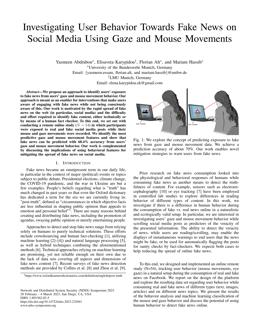As technical means for securing computing systems become ever more sophisticated, humans shift into the focus of attackers. By means of social engineering, attackers try to make people divulge confidential information or to perform certain actions, such as clicking on email attachments that would infect a system with malware.
Whereas current strategies to mitigate such attacks mainly focus on training users, we are interested in novel user interfaces that successfully protect against social engineering attacks. In particular, we are interested in means to detect social engineering attacks from users' behavior (such as physiological responses detectable from sensors) as well as in novel approaches for interventions. Areas of interest include, phishing attacks and deep fakes.
Selected Publications
 |
Yasmeen Abdrabou, Elisaveta Karypidou, Florian Alt und Mariam Hassib. Investigating User Behaviour Towards Fake News on Social Media Using Eye Tracking and Mouse Movements. In Proceedings of the Usable Security Mini Conference 2023. USEC'23. Internet Society, San Diego, CA, USA. [Download Bibtex] |